|
De Zuid-Afrikaanse schrijver en dichter Breyten Breytenbach werd geboren op 16 september 1936 in Bonnievale. Zie ook mijn blog van 16 september 2010 en eveneens alle tags voor Breyten Breytenbach op dit blog.
het manifest van de meelevendheid der dichters
wij zijn de dichters / wij gunnen elkaar de vrijheid van denken
en verbeelding / wij kijken naar elkaars
woordworstelingen als kleuters die Noachs archeologie
met boetseerklei vormgeven / en wij
zijn allemaal blij met de vruchten van andermans
handen / wij zijn de dichters / wij hebben grote
medeklinkende harten die belangeloos
opgaan in de liefde / wij zijn niet jaloers
of afgunstig / we voelen ons nooit afgescheept /
wij oordelen niet en veroordelen niet / wij
proberen elkaar niet te verdoezelen met de ikkesotische
concepten van het Empaier / noch
zullen wij een ander ooit vergiftigen met wierook
of hem met stroferoof het canongedonder insturen /
wij zijn de dichters / geringschattend
is als woord te tongbeduvelend om ooit
piekfijn en fris in een gedicht onderuit gehaald te worden
wij nemen niemand bij de neus en zijn niet zelfvoldaan /
wij bakkeleien immers niet om de kruimels
van de tafel van de baas / kijk, wij begluren nooit een ander
en apen nooit na / wij zijn de dichters / wij koeren
als vredesduiven wederzijdse bewondering /
bovendien: wij weten dat al onze lettergrepen torentjes zijn
van as en zandkasteeltjes op het land / en brandende
kaarsjes van ons op de tocht van de geschiedenis / daarom
zijn onze monden welluidend van meelevendheid /
want wij zijn de dichters / armzalige broeders en zusters /
dus waarom zouden wij ooit in elkaars gat
of oog willen koekeloerehoeren of de ander in de oven stoppen?
there is no time
there is no time
time is man's skin
it cracks and crackles and shrinks
in life's passing-by
in the fire of being
telling the hours
then letting them be
in the ever reverberating
moment of silence
in the smoking dance
of the evening star and the midnight sun
in the curl of the leaf
in the dove's swiftly
graceful and fluttered
gesture of dying
there is no time
time is the shooting
comet of recall
strewing heaven with the sparks
of stories no one will ever hear again
time's my love for you
the lizard movements
in your body that come and go
to fill the hollows
with the fire of telling
those many faces of departure
there is no time
just the pulse of the heart
as pain under eye-shells
just the emptied tell-skin
of this poem
splotched and measured
by cancer words of forgetting
like lizard shit
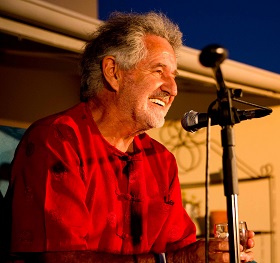
Breyten Breytenbach (Bonnievale, 16 september 1936)
De Nederlandse dichter Alfred Schaffer werd geboren in Leidschendam op 16 september 1973. Zie ook alle tags voor Alfred Schaffer op dit blog.
Aankomst en vertrek
De wekker is gesteld, als eilandjes liggen de kledingstukken
verspreid over de vloer. Het recht van de sterkste: op de rand
van een hotelbed, ver na middernacht. Een regenachtige nacht,
voorbij het punt waar stoppen en terug nog tot de mogelijkheden
hoorde. Gestommel op de gang, een enkele kreet. Uit vreugde
of afkeer, als blijk van opluchting, wie zal het zeggen. Tussen
de stilte boven een karige maaltijd en de ronding van een blote
schouder. Wie was hier eigenlijk aan het woord? Blijven ademen
is de enige oplossing, op weg naar het komende jaar, een volgend
seizoen. Totdat de dood ons scheiden zou. En kijk we lachten al.
Haar geur wordt alles
Achter ons raast een nachttrein
dor het weiland - wij kwamen van ver,
op verhaal, staan met lange jassen
in de gang, herhalen enkele gebaren.
Wij weten weer hoe deze vrouw ons
soms niet meer kon zien wanneer zij
door de grote kamer ijsbeerde, vlammen
van zich afsloeg, onverstaanbaar werd.
Iemand zal later, precies op dit moment
wellicht, met niet onvaste stem, zeggen
dat ook wij onze tijd hebben gehad.
Zoals afgesproken.
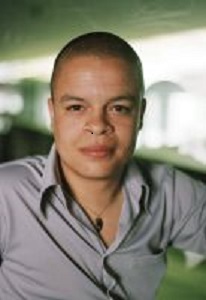
Alfred Schaffer (Leidschendam, 16 september 1973)
De Nederlandse schrijver Frans Kusters werd geboren in Nijmegen op 16 september 1949. Zie ook alle tags voor Frans Kusters op dit blog en ook mijn blog van 16 september 2010.
Uit: Het schaamtesyndicaat
“Zonder dat hij het ons aanvankelijk durfde te bekennen had Freek van Weegen vier uurtjes maatschappijleer per week aan de Van Schevichavenstraat in de wacht weten te slepen, na bemoeienissen van een oom of zwager van Sigrit, nota bene, maar dat hoorden Teeuwisse en ik pas later, toen Lucas Bertels ons gezelschap voor het patriarchaat van het Land van Maas en Waal had verruild en wij tweeën onze variant van het dolce far niente in praktijk probeerden te brengen. Vergeleken met de hoeveelheden die daaraan te pas kwamen was hij, Teeuwisse, nog een bescheiden drinker en ik, ach, ik verkeerde van meet af aan in de veronderstelling dat ik de tijd van mijn leven meemaakte en dat geen mens mij die na afloop ooit zou kunnen afnemen. Dachten de andere drie zoiets eveneens? Ik vermoedde het, maar ernaar vragen deed ik liever niet, want alles was beter in die dagen dan voor dom of - erger nog - naïef versleten te worden. (Toen ik in een vlaag van enthousiasme eens voorstelde ons verbond een naam te geven, was mij dat op ruim anderhalve minuut gezamenlijk zwijgen komen te staan en aan het eind van de avond had Van Weegen ‘voor alle zekerheid’ geïnformeerd of ik misschien ook invoering van viltkartonnen petjes propageerde, de hufter met zijn kromme pijpje.) Rechten studeerden wij, Bertels had zich om cosmetische redenen bovendien voor de filosofie laten inschrijven, maar dat bestaan fungeerde enkel als dekmantel, zoals atoomspionnen voor de nederigste overheidsdiensten kiezen. Onze geheime opdracht betrof de tijdgeest, de ontleding ervan, om precies te zijn, en daaraan hadden wij met ons vieren de handen meer dan vol. De ontleding van de tijdgeest. Toegegeven, de term had iets potsierlijks, maar dat konden wij ook niet helpen en het viel moeilijk vol te houden dat er maar met de duimen gedraaid moest worden, totdat er iemand met een betere op de proppen was gekomen. Want het ging niet goed met Nederland. Hoe vaster het in de greep van het totalitaire welzijn was geraakt, des te onbarmhartiger deed het schrikbewind van de leeghoofdigheid, het boerenbedrog en de wansmaak zich gelden, het was langzamerhand om wanhopig te worden.”
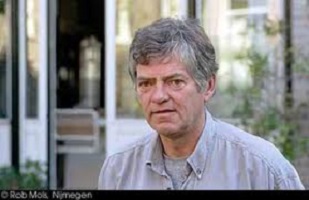
Frans Kusters (16 september 1949 - 20 november 2012)
De Amerikaanse schrijver Michael Nava werd geboren op 16 september 1954 in Stockton, Calefornië. Zie ook mijn blog van 16 september 2010 en eveneens alle tags voor Michael Nava op dit blog.
Uit:The Little Death
“Good morning, Henry, Novack drawled, looking up from the sports page. He had a pale, pudgy face and a wispy little moustache above a mouth set in a perpetual smirk. Novack treated me with the same lazy contempt with which he treated all civilians, not holding the fact that I was a lawyer against me. This made us friends of a sort.
Good morning, deputy, I replied.
We had ourselves a little bit of excitement here last night, he said, folding his paper. Los Altos brought in a drunk thats what they thought he was, anyway and it took three of us to subdue him.
What was he on?
Well we took a couple of sherms off of him when we finally got him stripped and housed, so it was probably PCP.
Why didnt I see an arrest report for him?
We couldnt book him until he came down enough to talk. Heres his papers.
I took the papers and asked, Wheres he at now?
In the drunk tank with the queens. Hes a fag.
Thats no crime, I reminded him.
Good thing, too, or wed have to charge admission around here.
I read the report. The suspects name was Hugh Paris. He stood five-foot ten, had blond hair and blue eyes. He refused to give an address or answer questions about his employment or his family. He had no criminal record. I studied his booking photo. His hair was in his face and his eyes went off in two different directions, but there was no denying he was an exceptionally handsome man.
How do you know hes gay? I asked.
They picked him up outside of that fag bar in Cupertino, Novack said.”
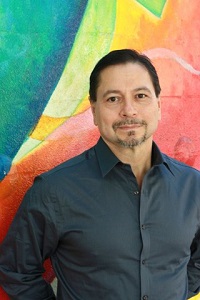
Michael Nava (Stockton, 16 september 1954)
De Amerikaanse schrijver Justin Haythe werd geboren op 16 september 1973 in Londen. Zie ook mijn blog van 16 september 2008 en ook mijn blog van 16 september 2010
Uit:The Honeymoon
“Whenever Claudia looked after me, she fried eggs with small cubes of smoked ham for my dinner. She sat next to me on her father's sofa, smoking cigarettes and arranging her rings and earrings into piles on the table. She taught me my first French words. She did not seem to mind that my mother and I were living in her father's apartment, or that I was sleeping in her bed. Later, as I lay in that bed, I would listen to her move around the apartment. She played the piano and, when she tired of that, she talked on the phone, laughing loudly. When she hung up, I felt a terrible silence as if she had gone out and I was left all alone. Perhaps she felt the same, for after a moment, she would make another call and when she had run out of phone calls she walked around, her footsteps indecipherable from the rattle of the windows, or the lives going on in neighbouring apartments.
At the end of August, it began to rain. Maureen sat each day at her desk in the small study near the kitchen. I spent most of the week sitting at the living-room window looking out. The building opposite echoed ours: red brick with a white balustrade, a black-speared fence guarding the edge of the pavement. I thought I could see figures in the windows, but it was usually just the reflections of the sky cramping in darkness overhead.
On the fourth successive day of rain, the skies calmed for about an hour. For a brief period the street became brighter, but very soon the clouds were shifting, threatening again. In the building opposite, lights came on in the windows and, with each, a square of reflected sky disappeared. I had the sensation I was not alone. I turned to find Claudia standing in the doorway. Her hair was damp. She looked at me, at first, as if she did not know me and then she smiled. 'Bonjour,' I said.“

Justin Haythe (Londen, 16 september 1973)
De Amerikaanse schrijver James Alan McPherson werd geboren op 16 september 1943 in Savannah, Georgia. Zie ook mijn blog van 16 september 2010 en eveneens alle tags voor James Alan McPherson op dit blog.
Uit: A Region Not Home: Reflections from Exile
“There was in those days a very subtle, but real, social distinction based on gradations of color, and I can remember the additional strain under which darker-skinned poor people lived. But there was also a great deal of optimism, shared by all levels of the black community. Besides a certain reverence for the benign intentions of the federal government, there was a belief in the idea of progress, nourished, I think now, by the determination of older people not to pass on to the next generation too many stories about racial conflict, their own frustrations and failures. They censored a great deal. It was as if they had made basic and binding agreements with themselves, or with their ancestors, that for the consideration represented by their silence on certain points they expected to receive, from either Providence or a munificent federal government, some future service or remuneration, the form of which would be left to the beneficiaries of their silence. Lawyers would call this a contract with a condition precedent. And maybe because they did tell us less than they knew, many of us were less informed than we might have been. On the other hand, because of this same silence many of us remained free enough of the influence of negative stories to take chances, be ridiculous, perhaps even try to form our own positive stories out of whatever our own experiences provided. Though ours was a limited world, it was one rich in possibilities for the future.
If I had to account for my life from segregated Savannah to this place and point in time, I would probably have to say that the contract would be no bad metaphor. I am reminded of Sir Henry Maine's observation that the progress of society is from status to contract. Although he was writing about the development of English common law, the reverse of his generalization is most applicable to my situation: I am the beneficiary of a number of contracts, most of them between the federal government and the institutions of society, intended to provide people like me with a certain status.”
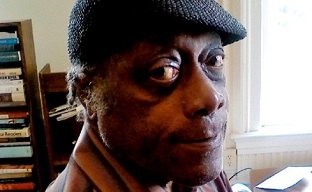
James Alan McPherson (Savannah, 16 september 1943)
De Frans-Zwitserse kunstenaar, dichter en schrijver Hans (Jean) Arp werd geboren op 16 september 1886 in Straatsburg. Zie ook mijn blog van 16 september 2010 en eveneens alle tags voor Hans Arp op dit blog.
Die Herzen sind Sterne (Fragment)
Ich spreche kleine, einfältige Sätze
leise für mich hin,
immerfort für mich hin.
Ich spreche kleine, alltägliche, geringe Sätze.
Ich spreche wie die geringen Glocken,
die sich wiederholen und wiederholen.
Sophie ist ein Himmel.
Sophie ist ein Stern.
Sophie ist eine Blume.
Alle Blumen blühen,
blühen für dich.
Alle Herzen glühen,
glühen für dich.
Nun bist du fortgegangen.
Was soll ich hier gehen und stehen.
Ich habe nur ein Verlangen.
Ich will dich wiedersehen.
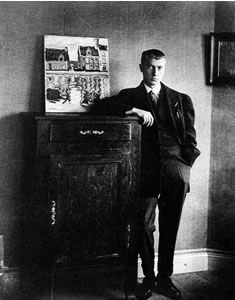
Hans Arp (16 september 1886 - 7 juni 1966)
Rond 1906/1907
Zie voor nog meer schrijvers van de 16e september ook mijn blog van 16 september 2011 deel 2.
16-09-2015 om 18:38
geschreven door Romenu 
Tags:Breyten Breytenbach, Alfred Schaffer, Frans Kusters, James Alan McPherson, Michael Nava, Justin Haythe, Hans Arp, Romenu
|

